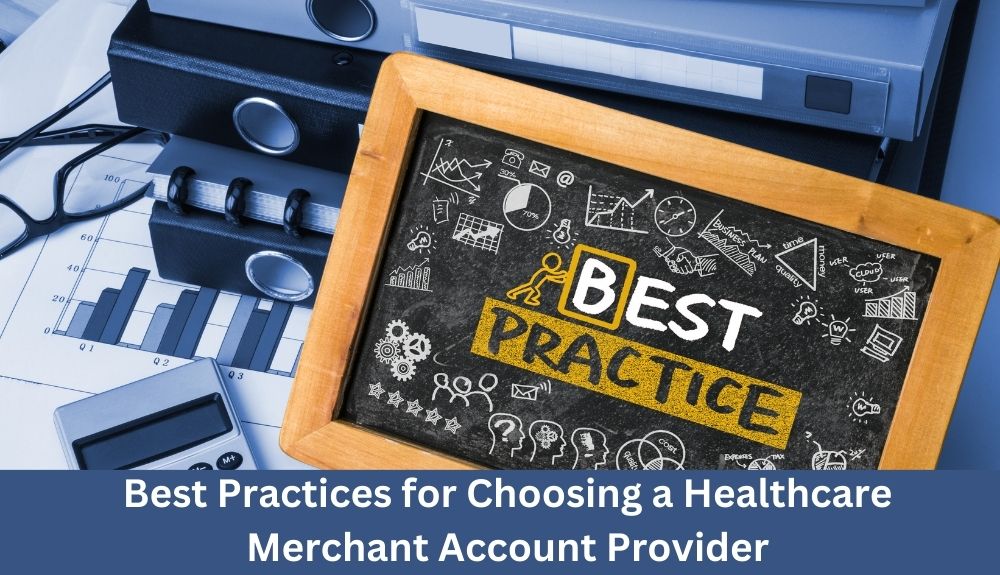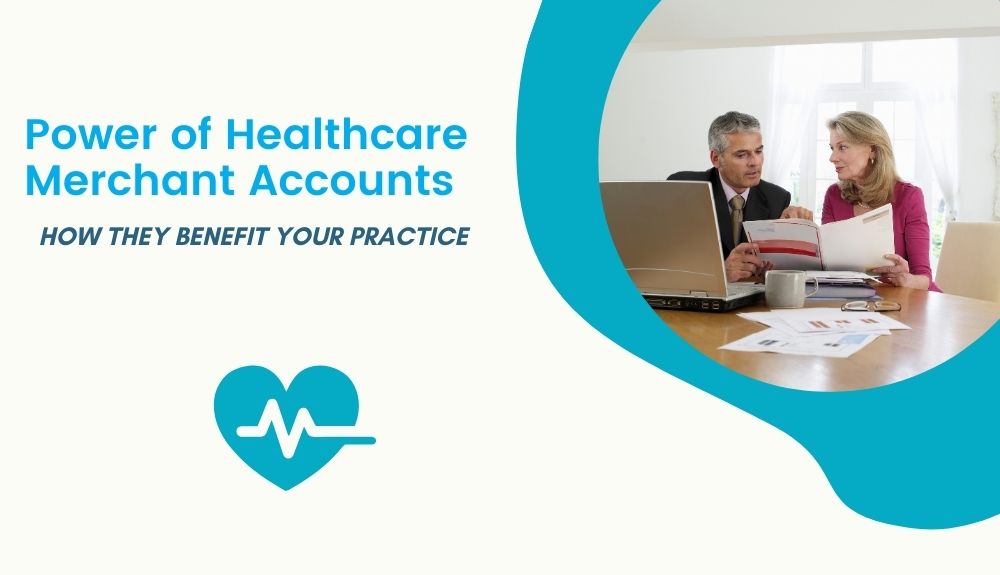Unlocking the Power of Healthcare Merchant Accounts: How They Benefit Your Practice

Stay Ahead of the Game: Find the Perfect Merchant Account for Your Fitness Center
December 14, 2023
A Beginner’s Guide to High Risk Merchant Accounts: Everything You Need to Know
December 16, 2023Are you a healthcare professional looking to optimize your practice’s financial operations? In today’s fast-paced world, leveraging the power of technology and streamlined payment systems has become crucial. That’s where healthcare merchant accounts come in, revolutionizing the way medical practices handle payments. From reducing administrative burdens to ensuring the security of sensitive patient information, these accounts offer a range of benefits that can transform your practice’s financial landscape.
1. What are Healthcare Merchant Accounts?
In the fast-paced world of healthcare, it is essential for medical practices and healthcare providers to have an efficient and secure payment processing system. This is where healthcare merchant accounts come into the picture. A healthcare merchant account is a specialized payment processing solution tailored specifically for the unique needs of the healthcare industry.
a. How do Healthcare Merchant Accounts work?
Healthcare merchant accounts provide a secure platform for processing credit card and debit card payments from patients and customers. These accounts enable healthcare businesses to accept payments through various channels, including in-person transactions, online payments, and even recurring billing for subscription-based services.
b. Benefits of Having a Healthcare Merchant Account:
i. Streamlined Payment Process:
With a healthcare merchant account, medical offices and practices can enjoy a more streamlined payment process. Patients can make payments using their preferred payment method, whether it’s through a credit card or a debit card. By offering multiple payment options, healthcare providers can enhance the convenience and flexibility for their patients.
ii. Improved Cash Flow Management:
By integrating a healthcare merchant account into their payment processing system, healthcare businesses can benefit from improved cash flow management. Payments are processed quickly, allowing medical practices to receive funds in a timely manner. This can be particularly advantageous for small healthcare businesses that rely on a consistent flow of revenue to meet their operational expenses.
iii. Enhanced Security:
Security is of utmost importance in the healthcare industry, especially when it comes to financial transactions and patient data. A reputable healthcare merchant account provider will ensure that all transactions are encrypted and comply with the highest security standards, such as HIPAA compliance. This provides peace of mind for both the healthcare business and their patients.
iv. Dedicated Customer Support:
Another valuable aspect of healthcare merchant accounts is the availability of dedicated customer support. Reliable merchant account providers offer responsive customer service to address any issues or concerns that may arise. This ensures that healthcare businesses can provide a positive payment experience for their patients and resolve any payment-related inquiries promptly.
v. Customized Solutions for Healthcare Businesses:
Healthcare merchant accounts are designed to meet the specific needs of the healthcare industry. They often come with features such as a virtual terminal for over-the-phone payments, recurring billing options for subscription-based services, and the ability to process payments through a secure online portal. These features cater to the unique requirements of medical practices, clinics, and other healthcare-related businesses.
2. Why Healthcare Merchant Accounts are Important for Your Practice
In today’s digital age, credit card payments have become the norm in almost every industry, including healthcare. Healthcare merchant accounts play a crucial role in streamlining payment processing and benefitting your practice in various ways. Let’s dive into why these accounts are essential for your healthcare business.
1. Enable Convenient Payment Options
With a healthcare merchant account, you can offer your patients the convenience of paying via credit or debit cards. This allows them to choose their preferred payment method, whether it’s swiping their card or using a mobile payment app. By providing multiple options, you are meeting the needs and preferences of your diverse patient base.
2. Improve Patient Satisfaction
In the healthcare industry, a positive patient experience is vital. Efficient payment processing through a merchant account contributes to a seamless patient journey. Patients appreciate the convenience and speed of paying electronically, as it saves them from the hassle of writing checks or carrying cash. By enhancing their experience, you foster patient satisfaction and increase the likelihood of repeat visits and positive word-of-mouth referrals.
3. Streamline Payment Processes
Gone are the days of manual payment handling and time-consuming administrative tasks. Healthcare merchant accounts integrate with your practice management system, allowing for automated and streamlined payment processes. You can generate invoices, process payments, and manage financial records efficiently, reducing errors and saving precious time for both your staff and patients.
4. Ensure Security and Compliance
As a healthcare provider, safeguarding sensitive patient information is of utmost importance. It is essential to work with a HIPAA-compliant payment processor that offers secure data transmission and storage. By partnering with a trusted merchant account provider that understands the healthcare industry’s unique needs, you can ensure data security and comply with regulations, protecting your patients’ privacy and maintaining their trust.
5. Access Dedicated Customer Support
Having a reliable payment processor means having access to dedicated customer support tailored to your healthcare business. From resolving technical issues to answering questions about transactions, a reputable merchant service company will provide responsive and knowledgeable assistance. This ensures smooth payment operations and minimizes disruptions to your practice.
💡 key Takeaway: Healthcare merchant accounts play a critical role in improving the payment experience for your patients. By enabling convenient payment options, streamlining processes, ensuring security and compliance, and offering dedicated customer support, these accounts benefit your practice and contribute to enhanced patient satisfaction.
3. Understanding the Process of Healthcare Merchant Account Setup
When it comes to running a healthcare practice, accepting credit card payments can greatly benefit both you as the healthcare provider and your patients. By setting up a healthcare merchant account, you gain access to efficient payment processing solutions tailored specifically to the needs of your medical office or medical-related business. In this section, we will explore the process of setting up a healthcare merchant account and how it can streamline your payment processes.
1. Research and Choose the Right Credit Card Processor
To get started, you need to research and choose a credit card processor that specializes in healthcare payment processing. Look for a merchant service company that understands the unique needs of the healthcare industry and offers solutions that comply with HIPAA regulations. Consider factors such as customer support, pricing options, and features like virtual terminal, which allows you to securely process payments online or over the phone.
2. Complete the Application Process
Once you have selected the right credit card processor, you will need to complete their application process to set up a healthcare merchant account. This typically involves providing information about your medical practice, such as your business name, address, and tax ID number. You may also be required to submit additional documentation, such as a business associate agreement to ensure the protection of sensitive patient information.
3. Set Up Payment Methods and Rates
During the setup process, you will have the opportunity to choose your preferred payment methods and rates. Consider offering a variety of options, including credit cards, debit cards, and even healthcare-specific payment methods. Determine whether you prefer a flat rate or a monthly fee structure and ensure that the rates offered by the credit card processor align with your budget and expected transaction volume.
4. Integrate with Your Existing Systems
Integration with your existing systems, such as your practice management software or electronic health records (EHR) system, is essential for seamless payment processing. Ensure that your chosen credit card processor offers integrations with popular healthcare software solutions. This integration will streamline your workflows and reduce manual entry errors, saving you time and ensuring accuracy in your billing and payment processes.
5. Ensure HIPAA Compliance
As a healthcare provider, safeguarding patient data is of paramount importance. Choose a healthcare merchant account provider that is HIPAA-compliant and offers robust security measures to protect sensitive patient information during payment processing. This includes utilizing encryption technology, maintaining secure data centers, and following industry best practices for data protection.
4. Features and Benefits of Healthcare Merchant Accounts

Healthcare merchant accounts offer a wide range of features and benefits that can greatly benefit your medical practice or healthcare business. By understanding these advantages, you can make an informed decision about integrating a healthcare merchant account into your payment processing system. Let’s explore the key features and benefits of healthcare merchant accounts below:
1. Seamless Credit Card Processing:
One of the primary features of healthcare merchant accounts is the ability to process credit card payments seamlessly. This enables you to offer your patients a convenient and flexible payment method, allowing them to pay for services using their preferred credit cards. By accepting credit card payments, you give your patients more payment options, resulting in increased customer satisfaction.
2. Secure Payment Processing:
Healthcare merchant accounts are designed to prioritize security and ensure the protection of sensitive patient data. With the increasing number of data breaches and cyber threats in the healthcare industry, using a reputable healthcare payment processor is crucial. These merchant accounts employ advanced encryption technologies and comply with industry standards, such as the Health Insurance Portability and Accountability Act (HIPAA). This ensures that all payment transactions are secure and meet the necessary compliance requirements.
3. HIPAA-Compliant Payment Processing:
For medical practices and healthcare businesses, maintaining compliance with HIPAA regulations is of utmost importance. A reputable healthcare merchant account provider understands the intricacies of HIPAA compliance and offers payment processing solutions that align with these regulations. By partnering with a HIPAA-compliant payment processor, you safeguard patient confidentiality and protect your practice from potential legal issues.
4. Dedicated Customer Support:
When choosing a healthcare merchant account, it is crucial to consider the level of customer support provided by the merchant service company. Look for a provider that offers dedicated customer support tailored to the unique needs of the healthcare industry. This ensures that you have access to assistance whenever you require it, whether it’s to resolve payment issues, address technical difficulties, or seek guidance on improving your payment processing system.
5. Different Payment Methods:
A reliable healthcare merchant account enables your practice to accept various payment methods beyond credit cards. This includes debit cards, allowing patients to pay directly from their bank accounts. Additionally, some merchant accounts offer a virtual terminal option, which allows you to process payments manually over the phone or through email. By diversifying your payment methods, you cater to the preferences of a wider range of patients.
5. How Healthcare Merchant Accounts Improve Patient Experience
A seamless and efficient payment process is crucial for enhancing the overall patient experience in a healthcare setting. Healthcare merchant accounts play a significant role in streamlining payment transactions and ensuring a positive interaction between patients and healthcare providers. Let’s explore the key ways in which healthcare merchant accounts contribute to improving patient experience.
1. Convenient Payment Options:
With a healthcare merchant account, healthcare practices can offer a variety of payment options to patients, including credit card, debit card, and even mobile payment solutions. This flexibility enables patients to choose the payment method that suits them best, making the overall payment process more convenient and hassle-free.
2. Faster Checkouts:
One of the primary advantages of healthcare merchant accounts is the ability to process payments in real-time. This means that patients don’t have to wait in long queues or deal with time-consuming manual payment processes. Instead, they can enjoy faster checkouts, reducing their overall waiting time and contributing to a more efficient and positive experience.
3. Enhanced Security Measures:
Security is paramount when it comes to healthcare transactions. Healthcare merchant accounts are designed to comply with industry regulations, such as the Health Insurance Portability and Accountability Act (HIPAA), ensuring that patient payment information remains secure and protected. Implementing a HIPAA-compliant payment processor instills trust in patients, demonstrating the healthcare provider’s commitment to safeguarding their personal data.
4. Improved Transparency:
When patients have access to detailed and transparent billing information, it enhances their understanding of the services provided and the associated costs. Healthcare merchant accounts offer robust reporting capabilities, allowing patients to review their invoices and payment receipts easily. Clear and comprehensive transaction records contribute to a sense of trust and transparency, minimizing any confusion or disputes.
5. Efficient Customer Support:
Choosing the right healthcare merchant service company ensures reliable customer support. In case of any payment-related queries or issues, having a dedicated support team can promptly address patient concerns. Timely and efficient customer service fosters a positive patient-provider relationship, creating a satisfying experience for patients, and ultimately enhancing their overall satisfaction.
💡 key Takeaway: Healthcare merchant accounts play a pivotal role in improving patient experience by offering convenient payment options, streamlining checkouts, enhancing security measures, providing transparency, and ensuring efficient customer support. By incorporating these accounts into their practices, healthcare providers can create a seamless and positive payment experience for patients, ultimately contributing to better patient satisfaction and loyalty.
6. Enhancing Financial Management with Healthcare Merchant Accounts
In today’s healthcare industry, efficient financial management is crucial for the success and stability of medical practices. One powerful tool that healthcare providers can utilize to streamline their payment processes and improve cash flow is a healthcare merchant account.
1. What is a healthcare merchant account?
A healthcare merchant account is a specialized type of payment processing account tailored to the unique needs of healthcare businesses. It allows medical offices, clinics, and other medical-related businesses to accept credit card payments from patients and insurance companies securely and efficiently.
2. Benefits of using a healthcare merchant account
a) Seamless payment processing: With a healthcare merchant account, healthcare providers can process payments quickly and securely, whether it’s for copayments, deductibles, or medical services. This ensures a smooth and convenient payment experience for both patients and medical staff.
b) Faster payments: By accepting credit and debit card payments through a healthcare merchant account, medical practices can significantly reduce the time it takes to receive payment. Instead of waiting for checks to clear or dealing with delayed insurance reimbursements, funds can be deposited directly into the practice’s account, improving cash flow and avoiding unnecessary delays.
c) Improved financial tracking: Healthcare merchant accounts often come with robust reporting and analytics tools. These allow practice owners to easily access and monitor transaction data, track revenue trends, and generate detailed reports. This level of financial visibility enables better decision-making and helps identify areas for improvement.
d) Enhanced security and compliance: Healthcare providers deal with sensitive patient information, which necessitates strict adherence to security standards, such as the Health Insurance Portability and Accountability Act (HIPAA). A reputable healthcare merchant account provider offers HIPAA-compliant payment processing solutions, ensuring that patient data remains secure during transactions.
e) Multiple payment options: A healthcare merchant account enables medical practices to accept a variety of payment methods, including credit cards, debit cards, and even electronic checks. This flexibility caters to the diverse preferences of patients and offers convenience in choosing their preferred payment method.
7. Ensuring Payment Security and Compliance with Healthcare Merchant Accounts
In the fast-paced world of healthcare, payment security and compliance are paramount. As a healthcare provider, ensuring that your patients’ sensitive financial information is protected is not just good business practice, but also a legal and ethical obligation. This is where healthcare merchant accounts play a crucial role.
1. The Importance of Payment Security
In an era where data breaches and cyber attacks are becoming increasingly common, safeguarding patient data is of utmost importance. Healthcare merchant accounts offer advanced security features that protect sensitive payment information. These accounts utilize encryption and tokenization techniques to ensure that credit card details are securely transmitted and stored. By partnering with a trusted credit card processor, healthcare businesses can mitigate the risk of financial fraud and protect their patients’ personal information.
2. Compliance with Industry Regulations
The healthcare industry is heavily regulated to protect patient privacy and ensure proper handling of sensitive information. One such regulation is the Health Insurance Portability and Accountability Act (HIPAA), which requires healthcare providers to implement stringent security measures to protect electronic patient health information (ePHI). Healthcare merchant accounts are specifically designed to be HIPAA-compliant, providing a secure payment processing environment and safeguarding ePHI in accordance with industry standards.
3. Meeting Payment Processing Needs
The unique needs of the healthcare industry call for specialized payment processing solutions. Healthcare merchant accounts offer features tailored to the specific requirements of medical practices, such as the ability to process co-pays, deductibles, and recurring payments. With a virtual terminal, healthcare providers can conveniently accept credit and debit card payments in-office or remotely. This flexibility improves convenience for both the medical office and patients, resulting in a smoother payment experience.
4. Dedicated Customer Support
When choosing a healthcare merchant account provider, it is crucial to consider the level of customer support offered. Look for a provider that specializes in servicing the healthcare industry and has a track record of excellent customer service. A knowledgeable support team can assist with technical issues, provide guidance on compliance matters, and address any concerns or questions that may arise. Having reliable customer support ensures that your payment processing runs smoothly and minimizes disruptions to your medical practice.
💡 key Takeaway: Healthcare merchant accounts provide essential payment security and compliance measures for healthcare providers. With advanced security features, HIPAA-compliant payment processing, tailored payment solutions, and dedicated customer support, these accounts offer peace of mind while improving the overall payment experience for both healthcare providers and patients alike.
8. Best Practices for Choosing a Healthcare Merchant Account Provider

When it comes to selecting a healthcare merchant account provider, it’s crucial to make an informed decision that aligns with the unique needs of your medical business. The right credit card processor can significantly impact your payment processing capabilities, customer service, and overall efficiency. To help you navigate this important decision, we’ve compiled a list of best practices to consider:
1. Determine Your Business Requirements: Before evaluating different merchant account providers, take the time to assess your specific needs. Consider factors such as the volume of credit card transactions, the average ticket size, and any additional payment methods (e.g., debit cards) you wish to offer. This evaluation will help you identify the features and services you require from a provider.
2. Ensure Regulatory Compliance: The healthcare industry requires special consideration due to HIPAA regulations and the importance of maintaining patient data security. It’s crucial to partner with a healthcare merchant account provider that understands these requirements and can offer a HIPAA-compliant payment processor. Verify that the provider has experience working with medical-related businesses and can provide a business associate agreement as needed.
3. Evaluate Pricing Structures: Payment processing fees can significantly impact your bottom line. When exploring different providers, examine their pricing structures. Some companies charge a flat rate per transaction or offer a tiered pricing system based on transaction volume. Pay close attention to any additional fees, such as monthly fees or higher rates for specific card types. Consider your business’s transaction volume and choose a pricing structure that aligns with your budget and expected transaction volume.
4. Research Customer Support: Prompt and reliable customer support is essential when dealing with payment processing issues. Look for a healthcare merchant account provider that offers excellent customer service. Consider factors such as response times, availability of support channels (e.g., phone, email), and reputation for resolving issues promptly. Reading reviews and seeking recommendations from fellow healthcare providers can provide valuable insights into a provider’s customer support quality.
5. Assess Integration and Technology: Seamless integration between your merchant account provider and your existing medical office systems is vital for efficient operations. Explore the compatibility of the provider’s payment gateway with your current software, electronic health record systems, or virtual terminals. Additionally, ensure that the provider offers advanced security measures, such as tokenization, encryption, and fraud prevention tools, to protect sensitive cardholder data.
9. Future Trends in Healthcare Merchant Accounts
As the healthcare industry continues to evolve, so do the trends in healthcare merchant accounts. Staying up-to-date with the latest advancements in payment processing can provide numerous benefits for healthcare providers and medical practices. Let’s explore some of the future trends in healthcare merchant accounts that are shaping the way payments are processed in the industry.
1. Mobile Payment Solutions
With the increasing use of mobile devices, healthcare merchant accounts are embracing mobile payment solutions. By accepting payments through mobile devices such as smartphones and tablets, healthcare providers can enhance convenience for both patients and staff. This trend enables patients to make secure payments on-the-go, streamlining the entire payment process.
2. Contactless Payments
In the wake of the COVID-19 pandemic, contactless payments have gained significant popularity across various industries, including healthcare. Many healthcare merchant account providers now offer contactless payment options, allowing patients to make payments without physical contact with the payment terminal. This not only improves safety but also enhances efficiency, making the payment process quicker and more convenient.
3. Integrated Payment Systems
To streamline operations and improve efficiency, healthcare merchant accounts are moving towards integrated payment systems. These systems enable seamless integration of payment processing with other essential functions such as billing, scheduling, and electronic health records (EHR). By consolidating payment-related tasks into a single platform, healthcare providers can reduce errors, save time, and enhance overall practice management.
4. Enhanced Security Measures
Data security is a top priority in the healthcare industry, and healthcare merchant accounts are implementing enhanced security measures to protect sensitive patient information. This includes implementing advanced encryption techniques, complying with industry regulations such as the Health Insurance Portability and Accountability Act (HIPAA), and providing secure payment gateways. By prioritizing data security, healthcare providers can build trust with their patients and safeguard sensitive information.
5. Subscription-based Payment Models
In line with changing consumer preferences, healthcare merchant accounts are adapting to subscription-based payment models. This trend allows patients to subscribe to ongoing services and make recurring payments. For example, a medical practice can offer a membership program where patients pay a monthly fee to access certain healthcare services or benefits. Subscription-based payment models provide a predictable revenue stream for healthcare providers and enhance patient loyalty.
💡 key Takeaway: The future of healthcare merchant accounts is characterized by mobile payment solutions, contactless payments, integrated payment systems, enhanced security measures, and subscription-based payment models. Staying aware of these trends can help healthcare providers optimize their payment processing.
Conclusion
In conclusion, healthcare merchant accounts are a powerful tool that can greatly benefit your medical practice. By offering convenient payment options, you can improve patient satisfaction and loyalty. Not only that, but healthcare merchant accounts also streamline administrative tasks, reduce paperwork, and increase efficiency. With the increasing popularity of online payments and the demand for contactless transactions, having a healthcare merchant account is essential. It enables you to accept credit card payments, online payments, and even mobile payment solutions, catering to the preferences of your tech-savvy patients. Furthermore, with the added security features and PCI compliance measures associated with healthcare merchant accounts, you can ensure the safety of patient information and safeguard against fraud.




